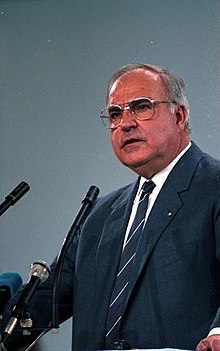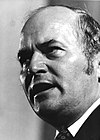Cabinet Kohl I.
The Kohl I cabinet was the 14th government cabinet of the Federal Republic of Germany and was the first and so far only federal government to come into office by means of a constructive vote of no confidence , namely against the previous government under Federal Chancellor Helmut Schmidt .
By means of a vote of confidence that Helmut Kohl initiated and lost, and the dissolution of the 9th German Bundestag by Federal President Karl Carstens , the government ended when the 10th German Bundestag met in 1983.
| Cabinet Kohl I. | |
|---|---|
| 14. Cabinet of the Federal Republic of Germany | |

|
|
| Chancellor | Helmut Kohl |
| choice | no |
| Legislative period | 9. |
| Appointed by | Federal President Karl Carstens |
| education | 4th October 1982 |
| The End | March 30, 1983 |
| Duration | 0 years and 177 days |
| predecessor | Schmidt III cabinet |
| successor | Cabinet Kohl II |
| composition | |
| Party (s) | CDU / CSU, FDP |
| representation | |
| German Bundestag | 279/519 |
| Opposition leader | Herbert Wehner ( SPD ) |
cabinet
Political measures
Economic and social policy
- Increase in the contribution to unemployment insurance from 4 to 4.6 percent
- Reduction of subsidies for the Federal Labor Office by 1.3 billion German marks
- Reintroduction of the health insurance contribution for pensioners
- Reductions in child and housing benefits as well as training grants
- Introduction of a non-interest-bearing, repayable investment aid tax limited to 1983/84 (“ compulsory tax”) of 5 percent of the tax liability for higher earners; is declared unconstitutional in 1984
- Reduction of tax burdens on companies
Military service
- The oral test of conscience for conscientious objectors will be abolished.
- Extension of the civil service from 16 to 20 months
Environmental policy
- Decision to reduce pollutants from power plants
See also
- List of the German federal governments
- List of German federal ministers
- Coalition agreement of the black and yellow federal government in Germany 1982
















